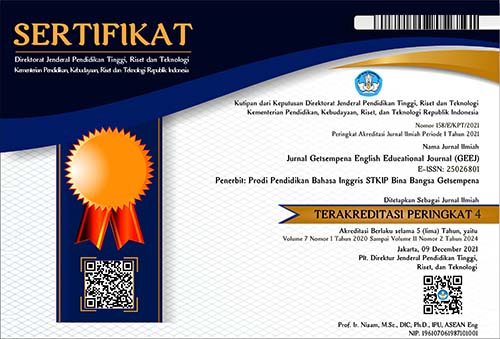CONTENT ANALYSIS OF ENGLISH SUBJECT IN CURRICULUM 2013 FOR JUNIOR HIGH SCHOOL LEVELS
Abstract
As a framework, curriculum 2013 focuses on four aspects which are religious, attitude, knowledge, and skills. However, there are still confusions among teachers in applying their teaching practices based on it. Thus, this study is designed to provide information of the current framework, curriculum 2013, especially for English subject in junior high school level. Furthermore, it is analysed based on components which appear in the curriculum. The result shows that the curriculum benefits English teachers because of its flexibility and detail components to carry out teaching. It accomplishes the requirements as an integrated framework. It supports a view of using English to learn new knowledge and supports learning integrated skills. In addition, it requires skilful English teachers to carry out teaching and learning processes since it focuses on giving learners real-life experiences in their learning.
References
Brown. H. D. (2007). Teaching by Principles: An Interactive Approach to Language Pedagogy, Third Edition. Pearson Education ESL.
Celce- Murcia M and Olsthain E. (2000). Discourse and Context in Language Teaching. A Guide for Language Teachers. New york, USA: Cambridge University press. (Chapter 10)
Chew, S.B. & Leong, Y.C. (Eds.). (1995). Private Tuition in Malaysia and Sri Lanka: A Comparative Study. (Project Directors: T. Marimuthu; W.A. de Silve). Kuala Lumpur: Department of Social Foundations in Education, University of Malaya
Drake, S. M and Burns, R.C. (2004). Meeting Standards Through Integrated Curriculum. USA: ASCD Publications.
Ellis, T.J. & Levy, Y. (2010). A Guide for Novice Researchers: Design and Development Research Methods. Proceedings of Informing Science & IT Education Conference (InSITE)
Feez, S. (1998). Text- Based Syllabus Design. Sydney: National centre for English Language Teaching and Research. Chapter 1
Krashen, S. D. (1982). Principles and Practice in Second Language Acquisition. Oxford: Pergamon.
Kurikulum 2013 Bahasa Inggris SMP
Lightbown, P., & Spada, N.M. (2003). How languages are learned. Oxford: Oxford University Press.
Marcellino, M. (2008). English Language Teaching in Indonesia: A Continuous Challenge in Education and Cultural Diversity. TEFLIN Journal, Volume 19, Number 1, February 2008
Richard-Amato, P. R. (2009). Making it Happen Fourth Edition: From Interactive to Participatory Language Teaching, Theory and Practice. Pearson Education Usa
Yung, KWH. (2015). Learning English in the Shadows: Understanding Chinese Learners' Experiences of Private Classes. Hongkong: The University of Hongkong
Zhan, et.al. (2013). The Effectiveness of Private Classes: Students’ Perceptions in Comparison with Mainstream Schooling in Hong Kong. Asia Pacific Education Review, Vol.14, No.4, pp.495-509

























